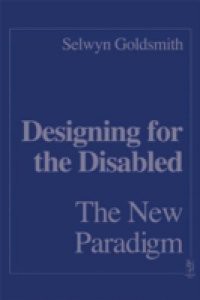Selwyn Goldsmith's Designing for the Disabled has, since it was first published in 1963, been a bible for practising architects around the world. Now, as a new book with a radical new vision, comes his Designing for the Disabled: The New Paradigm.Goldsmith's new paradigm is based on the concept of architectural disability. As a version of the social model of disability, it is not exclusively the property of physically disabled people. Others who are afflicted by it include women, since men customarily get proportionately four times as many amenities in public toilets as women - and women have to queue where men do not - and those with infants in pushchairs, because normal WC facilities are invariably too small to get a pushchair and infant into.To counter architectural disability, Goldsmith's line is that the axiom for legislation action has to be 'access for everyone' - it should not just be 'access for the disabled', as it presently is with the Part M building regulation and relevant provisions of the 1995 Disability Discrimination Act. In a 40-page annex to his book he sets out the terms that a new-style Part M regulation and its Approved Document might take, one that would cover alterations to existing buildings as well as new buildings. But architects and building control officers need not, he says, wait for new a legislation to apply new practical procedures to meet the requirements of the current Part M regulation; they can, as he advises, act positively now.This is a book which will oblige architects to rethink the methodology of designing for the disabled. It is a book that no practising architect, building control officer, local planning officer or access officer can afford to be without.

